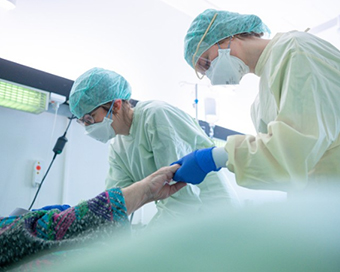Gallery
 PM Modi visit USA
PM Modi visit USA Only the mirror in my washroom and phone gallery see the crazy me : Sara Khan
Only the mirror in my washroom and phone gallery see the crazy me : Sara Khan Karnataka rain fury: Photos of flooded streets, uprooted trees
Karnataka rain fury: Photos of flooded streets, uprooted trees Cannes 2022: Deepika Padukone stuns at the French Riviera in Sabyasachi outfit
Cannes 2022: Deepika Padukone stuns at the French Riviera in Sabyasachi outfit Ranbir Kapoor And Alia Bhatt's Wedding Pics - Sealed With A Kiss
Ranbir Kapoor And Alia Bhatt's Wedding Pics - Sealed With A Kiss Oscars 2022: Every Academy Award Winner
Oscars 2022: Every Academy Award Winner Shane Warne (1969-2022): Australian cricket legend's life in pictures
Shane Warne (1969-2022): Australian cricket legend's life in pictures Photos: What Russia's invasion of Ukraine looks like on the ground
Photos: What Russia's invasion of Ukraine looks like on the ground Lata Mangeshkar (1929-2022): A pictorial tribute to the 'Nightingale of India'
Lata Mangeshkar (1929-2022): A pictorial tribute to the 'Nightingale of India' PM Modi unveils 216-feet tall Statue of Equality in Hyderabad (PHOTOS)
PM Modi unveils 216-feet tall Statue of Equality in Hyderabad (PHOTOS)The Badminton Association of India (BAI) has announced a 14-member-strong India squad for
- Men’s Sr Hockey Nationals to be played in division-based format from April 4
- Mensik denies Djokovic 100th title in Miami final
- KIPG: Son of a vegetable vendor, Bihar’s Jhandu Kumar eyes Worlds, 2028 Paralympics
- Hardik Singh credits hard work and team unity for receiving HI Midfielder of the Year award
- Djokovic, Alcaraz land in same half of Miami draw
COVID-19 survivors are returning to hospitals with reduced heart functions Last Updated : 10 Oct 2020 02:50:40 PM IST 
Covid patient (file photo) It has been evident that the impact of COVID-19 is way beyond influenza like conditions. Over the last few months, doctors and medical officials have realised that COVID-19 affects many more organs than just the lungs or the respiratory tract. Dr. Dinesh Kumar Mittal, Director & HOD, Adult CTVS (Cardiothoracic and Vascular Surgery), Fortis Hospital, Shalimar Bagh talks about how the heart is impacted by the virus.
A growing number of researches have suggested that many COVID-19 survivors have experienced some or the other kind of heart damage. Many of them did not have any heart diseases earlier neither were they sick enough to be hospitalised. However, health experts later worried about an increase in heart failure. A few reports have also suggested that when imaging tests were taken months after COVID-19 recovery, patients have displayed lasting damage to the heart muscles.Doctors have noticed that once a patient tests negative for COVID 19, one of the major things that is affected is the heart, where patients are developing myocarditis (inflammation of the heart tissue). The degree varies from mild to moderate. After recovery patients have reportedly gone back to the hospitals with reduced heart functions and heart attack and strokes. There have also been patients who returned to the hospital emergency ward with complaints of variable heart rates, breathlessness and chest pain.A sample study done by Journal of American Medical Association (JAMA), Cardiology examined MRI results of approximately 100 COVID positive patients based out of Frankfurt, Germany. They studied the patients between the months of April-June 2020. All the patients who participated were heathy between the ages of 40-50 and they successfully recovered from the infection.Of the 100 patients, 67 people who suffered were asymptomatic or had moderated symptoms. By the end of the study, it was observed that 78 of the 100 patients had reported symptoms of heart damage and inflammation. The fact that there was a large percentage of people who reported heart related problems post testing negative, says that there is still a lot that we do not know about the long term consequences of the testing positive with the virus.A study done by a UK based institution that found a similar pattern in patients infected with the virus. The research was done on 1216 COVID patients across 6 continents and it found that there is a pattern of heart abnormalities and disruptions. 15 percent of the patients displayed severe heart abnormalities despite never having any history of cardiac diseases.Another trend that was been noticed during a study done in the United States is that among athletes who are COVID-19 survivors, one out of seven of them are facing heart related issues. Therefore, doctors have recommended cardiac screening tests for professional athletes who have contracted that virus and recovered from it. The athletes, once they tested negative for COVID-19, had faced heart damage even though they had only mild to moderate symptoms of COVID-19.Although a scientific link to what causes these effects on the heart are yet to be established, post COVID rehabilitation is something that the country needs to look at now. A lot more research needs to be done on this subject. Hence, hospitals and researchers will have to start gathering data to study survivors. It is important to remember that most people recover from COVID-19 quickly, which is within a span of 14 days post testing positive with the virus. However, long lasting problems due to COVID-19 has made it even more important or us to ensure we reduce the spread of the disease by taking necessary precautions like wearing masks, keeping ourselves sanitised and avoiding crowded areas.IANS New Delhi For Latest Updates Please-
Join us on
Follow us on








172.31.16.186







